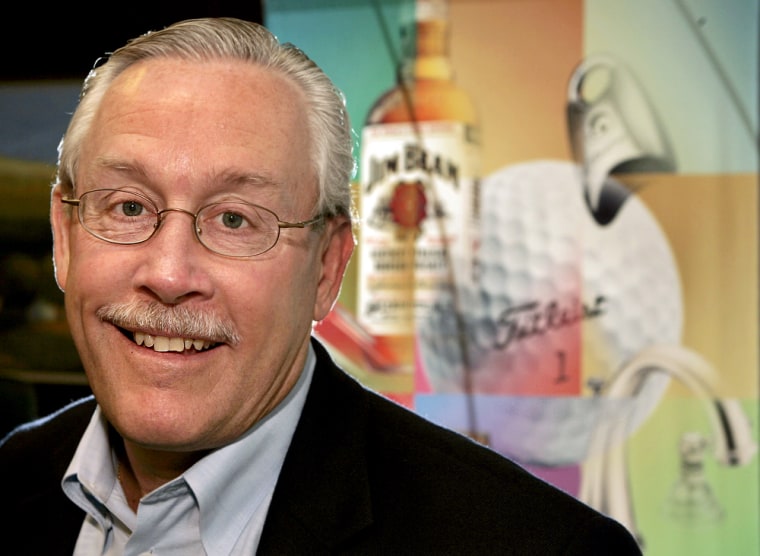Fortune Brands Inc.’s eclectic mix of golf balls, whiskey, faucets and staplers hasn’t always made sense on Wall Street.
As other consumer goods manufacturers pruned their portfolios to please investors, it plodded along with a collection of seemingly unrelated products that could be hit, worn, sipped, locked or stored.
“Fortune Brands’ diversification isn’t paying off,” declared the headline on one analyst’s report in 2001. Another called its stock “a dog.”
After years of steady sales and double-digit income gains, the skepticism has evaporated. It turns out the maker of Moen faucets, Jim Beam bourbon, Titleist golf gear and Swingline staplers had a winning combination all along.
Its stock price has quadrupled in less than five years and consistent profits put it in position to make its biggest deal ever — the purchase of more than 20 new spirits and wine brands from British liquor company Allied Domecq PLC in a $5 billion deal that closes Tuesday.
Capping a major transformation this summer, the company is even narrowing its focus by spinning off its billion-dollar office products unit, ACCO World Corp., and merging it with smaller General Binding Corp. in a move to be completed in mid-August.
Chairman and Chief Executive Norm Wesley — who endured a more than 50 percent drop in the share price in the first year after he took over in December 1999 — doesn’t gloat about the turnaround. But the posting of a recent newspaper article headlined “Fortune’s stock sets record as deal nears” on a bulletin board near his office conveys a sense of vindication.
“Diversity has worked well for us,” Wesley said in an interview at company headquarters just north of Chicago. “You can be skeptical, but you’ve got to look at the track record.”
Recent results have embellished that record. Following a 2004 in which earnings jumped 35 percent on $7.3 billion in sales, up 18 percent, the company last week announced double-digit growth in earnings and revenue for the most recent quarter.
“Investors only complain about a diverse portfolio when the portfolio isn’t achieving results,” said Eric Bosshard, an analyst for Cleveland-based FTN Midwest Research. “You can say does it make sense to be in spirits and homes and golf, but when you post the results that this company has lately, you have to say ’Yes it does.’ It’s hard to argue with the results.”
True to its unflashy reputation, Fortune owns none of the world’s 100 most valuable brands as ranked this month by Interbrand Corp. and Business Week magazine. It does, however, have 19 brands that topped $100 million in sales last year, led by Moen and including Titleist, Jim Beam, Therma-Tru doors, Waterloo tool storage, Master Lock padlocks and DeKuyper liqueurs.
None are billion-dollar brands, but Wesley said the company focuses on strong growth categories where it can be a collective No. 1 or 2 with its products. For example, six of its $100 million brands — Aristokraft, Omega, Kitchen Craft, Schrock, HomeCrest and Diamond — are cabinets that generated $1.3 billion in sales last year.
“Our strategy is to invest behind leading consumer brands ... and aggressively take costs out of our business to improve returns,” he said.
Founded in 1985, Fortune Brands is the successor to American Brands Inc., a $16 billion conglomerate that once was the world’s biggest cigarette company. It completed its evolution from tobacco and insurance to consumer products in 1997.
Wesley, 55, has padded the company’s home and hardware and spirits and wine businesses with a series of acquisitions. He tried to unload the less profitable office products unit in 2001 but failed, waiting until this year to work out the ACCO World spinoff.
“I think we’ve been both disciplined and patient to tee up the opportunities when we could,” he said.
Sticking with four disparate business lines may have kept Fortune Brands off many investors’ “Buy” lists, and some expert observers think it still has identity issues.
“This is a very under-covered company by Wall Street,” said Don Gher, chief investment officer of Bellevue, Wash.-based Coldstream Capital Management, which owns shares in the company. “It has to do with the fact that this was covered by tobacco analysts for years, and once it moved away from tobacco analysts it kind of got ignored.”
The Allied Domecq deal should increase attention, along with sales in Fortune Brands’ most profitable business — spirits.
Adding brands including Sauza tequila, Canadian Club whisky, Courvoisier cognac and some premium Californian wines more than doubles its spirits business from $1.2 billion to $2.5 billion. It also elevates it to No. 4 worldwide behind Britain’s Diageo PLC, France’s Pernod Ricard SA and Bermuda-based Bacardi Ltd., and makes it a stronger No. 2 behind Diageo in the U.S. market.
The company plans a marketing push to trumpet its new products, but it’s unlikely to make Fortune Brands a household name. Advertising brands under a corporate parent’s name simply “doesn’t work,” according to Wesley.
Demographics may help its other businesses as an aging population spends more on home and hardware products, which now account for slightly more than half of sales. Analysts say the bursting of a U.S. housing-price bubble would hurt Fortune’s sales from new home construction, although the company maintains the thriving repair and remodeling market will help offset any impact.
Baby boomers have been counted on to keep its golf business booming, too, but the number of golfers has remained stagnant for four years. Wesley, a golfer for 25 years with a 15 handicap, is perplexed at the lack of growth but brushes off suggestions the golf unit could be the next to be divested.
While he won’t rule out Fortune Brands making other deals, following through on the back-to-back multibillion-dollar deals is enough for now.
“We’ve got a lot of work to do,” he said.
